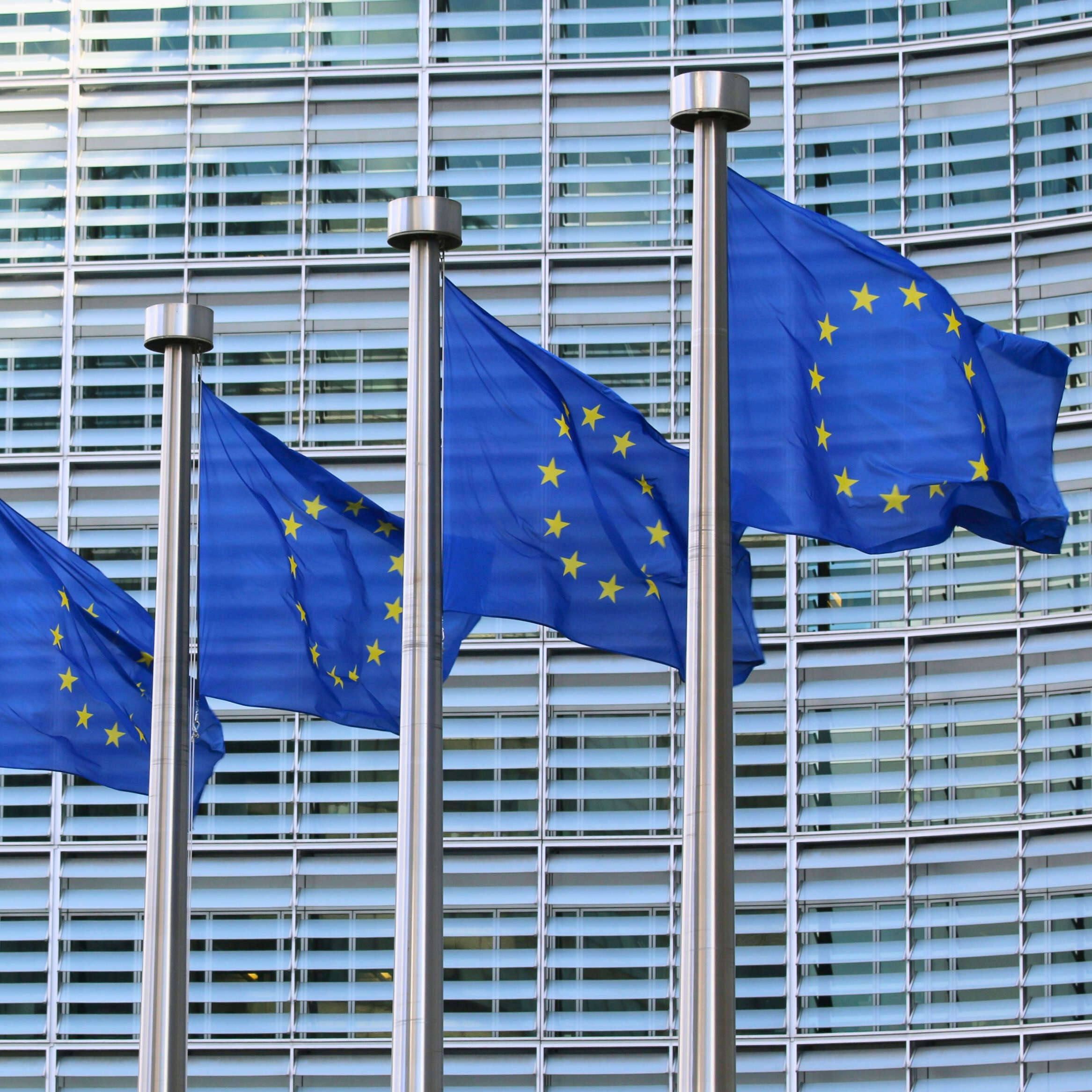





We constantly advance our approach to always deliver state-of-the-art compliance services.

We are committed to deliver outstanding results in every compliance solution.

We are dedicated to offering future-looking solutions with long-term impact.

We uphold the highest ethical standards, fostering transparency and building trust.


Designed for your sector’s unique needs


From research to real-world application


We see the whole picture


Bridging European expertise with worldwide reach


Leading the way in AI compliance
Have you considered the profound economic and reputational impact of facing sanctions from the European Union for non-compliance with the AI Act?
Addressing risks today, will avoid drastic negative escalation tomorrow. Prevent disruptive crises in your organization and ensures long-term success and resilience.
The EU AI Act imposes substantial fines for non-compliance, with penalties reaching up to 7% of a company’s global annual turnover or €35 million, whichever is higher. For large corporations, this could result in multi-million euro fines, which can have a significant impact on financial health. For instance, a company with a global turnover of €1 billion, could suffer a potential fine as high as €70 million. Prioritize early compliance prevent these severe penalties and safeguard the financial stability.

Non-compliance with the EU AI Act can lead to significant public backlash and severely damage your company’s reputation. This reputational harm might translate into substantive economic losses, decreased customer loyalty, and reduced market share. Complying with the Act mitigates these risks and demonstrates a commitment to ethical AI practices, contributing building trust with customers, partners, and stakeholders, ultimately stimulating investments and enhancing your company’s long-term success and stability.

Compliance with the EU AI Act is essential for continued access to the European market. Non-compliant AI systems may be banned from use within the EU, limiting your business opportunities in one of the world's largest markets.

Non-compliance with the EU AI Act can lead to legal challenges and liabilities. By ensuring your AI systems are compliant, you reduce the risk of legal disputes, protecting your company from lawsuits and associated damages.

The EU AI Act is likely to set a global standard for AI regulation. Complying now helps your company stay ahead of the game, being prepared for similar regulations in other jurisdictions, and reducing future compliance costs.

Empowering your organization with the cutting-edge and rigorously vetted techniques, knowledge and governance needed to maintain full control over AI processes, services, and systems.

We analyze your AI system
We conduct comprehensive audits to your company’s AI systems to identify compliance gaps and areas of improvement.

We assist the reorganization of your AI operations
We assist in restructuring your AI processes to align with the requirements of the EU AI Act, ensuring efficient and compliant workflows.

We empower your team
We provide targeted training sessions for your teams, equipping them with the necessary skills to manage AI systems in compliance with the latest regulations.

We equip you with innovative tools
We recommend and implement advanced tools that enhance your ability to monitor, control, and optimize AI processes, ensuring compliance.
Navigating the legal complexities of the EU AI Act is critical for the development and use of AI systems within your organization. We guide you on this path.

We assure regulatory alignment
We help you adapt existing AI systems or develop new ones that comply with the latest legal obligations under the EU AI Act.

We develop a company compliance Strategy
We work with your legal and compliance departments to create a robust strategy that addresses all aspects of the AI Act, from data governance to ethical AI use.

We draft and review your company’s policies
Our experts draft or review policies and procedures to ensure they meet your regulatory requirements, minimizing legal risks.

We help you looking at the future
We provide ad-hoc legal support to help your organization stay ahead of regulatory changes and maintain compliance over the time.
Reputation drives your business forward. AI compliance goes beyond merely adhering to regulations. It’s also about safeguarding your organization's reputation. Proactive compliance not only mitigates risks but also positions companies as leaders in responsible AI implementation.

We conduct a Reputation Risk Assessment (RRA)
We evaluate the potential impact of your AI systems on your brand’s reputation, identifying risks and opportunities.

We develop a company compliance Strategy
We work with your legal and compliance departments to create a robust strategy that addresses all aspects of the AI Act, from data governance to ethical AI use.

We develop and implement your Reputation-Safe Adaptation Plan (RSP)
We guide you in aligning your AI processes and services with ethical standards and public expectations, ensuring your organization's reputation is well-protected.

We guide your stakeholder Communication strategy
We assist in drafting clear and transparent communications strategies to maintain stakeholder trust and confidence in your products and services.
In business timing is everything.
Companies and organizations are meant to take advantage of the adaptation period to align their structure and operations to the AI Act requirements, which will be fully enforced as from 02 August 2026.
We help your company throughout this process, contact us.
12 July
2024
01 August
2024
Today
02 August
2026
The AI Act (EU Regulation 2024/1689) published in the Official Journal of the European Union
AI Act entered into force
Adaptation period
Full enforcement of the AI Act will be in effect.
12 July 2024
The AI Act (EU Regulation 2024/1689) published in the Official Journal of the European Union
01 August 2024
AI Act entered into force
Adaptation period
02 August 2026
Full enforcement of the AI Act will be in effect.

While we cater to a broad spectrum of industries, we excel in understanding the unique needs and intricacies of select sectors. Our team is composed of professionals with deep experience and connections across various specific sectors, making our approach truly multidisciplinary. This allows us to provide tailored solutions, ensuring that we address the specific challenges and opportunities inherent to each field. With our specialized expertise, we guide you with the precision and insight necessary to meet your industry's distinct demands.
Compliance with the EU AI Act is crucial for companies in the Pharmaceutical and Medical sectors due to the extensive use of AI throughout the entire value chain, from research and drug discovery to commercialization, diagnostics, patient care, and supply chain management. The sector’s reliance on AI introduces significant risks, particularly concerning patient safety, ethical standards, and regulatory scrutiny. The Act mandates stringent requirements for AI transparency, risk management, and human oversight, ensuring that AI-driven medical devices, software, and processes are safe, reliable, and ethical at every stage.
Non-compliance could lead to severe consequences, including legal liabilities, financial penalties, and reputational damage. Moreover, adhering to the Act helps companies navigate the complex regulatory landscape, build trust with stakeholders, and ensure that AI innovations meet the highest standards of patient care and data privacy. Proactive compliance not only mitigates risks but also positions companies as leaders in responsible AI use across all aspects of the pharmaceutical and medical value chain, which enables you to automate high-risk tasks efficiently while ensuring that human effort is focused on areas where accountability and ethical considerations are paramount..
Industry with high-risk activities as per the AI Act
Pharma companies using AI to improve their services
Penalties for non-compliance of an average pharmaceutical company
Increase in Investment in pharma and medical companies due showing compliance with AI Technologies
Compliance with the EU AI Act is of paramount importance for the aviation industry, given its critical role in global transportation and safety. In aviation, AI systems are increasingly integral to functions such as predictive maintenance, air traffic management, flight optimization, and passenger service automation. The Act enforces rigorous standards for AI deployment to ensure safety, prevent biases, and protect sensitive data, all of which are essential for maintaining operational integrity and public trust in the aviation sector.
Industry with high-risk activities as per the AI Act
Pharma companies using AI to improve their services
Penalties for non-compliance of an average pharmaceutical company
Increase in Investment in pharma and medical companies due showing compliance with AI Technologies
Compliance with the EU AI Act is increasingly critical for companies in the Media and Telecommunications industry, as AI technologies have become deeply integrated into nearly every aspect of their operations. In the media sector, AI is used extensively in content creation, curation, and distribution, enabling personalized content recommendations, automated video editing, and targeted advertising. In telecommunications, AI powers predictive maintenance, optimizes network performance, and enhances customer service through AI-driven chatbots and virtual assistants. These advancements not only drive innovation and efficiency but also play a crucial role in maintaining competitive advantage in a fast-paced industry.
However, the pervasive use of AI also introduces complex challenges. The potential for bias in content algorithms, risks to user data privacy, and the ethical implications of automated decision-making processes are of particular concern. As AI systems gain more autonomy in influencing public opinion, managing sensitive data, and making real-time decisions in critical infrastructure, the stakes for ensuring that these systems are trustworthy, transparent, and well-regulated are higher than ever. This growing reliance on AI heightens the scrutiny from regulators, making it imperative for companies to rigorously adhere to the AI Act's requirements to avoid significant risks and liabilities.
Compliance with the EU AI Act is crucial for companies operating in the transport and automotive sectors as it directly impacts the future of mobility, safety, and innovation. The Act sets stringent requirements for AI systems, particularly those related to autonomous driving, predictive maintenance, and fleet management. Ensuring compliance not only avoids significant fines but also builds trust with customers and regulatory bodies. With AI driving the next generation of smart vehicles and logistics solutions, adherence to these regulations is essential to maintain competitiveness and operational integrity.
Moreover, the EU AI Act emphasizes transparency, risk management, and ethical AI usage, all of which are critical in an industry where safety is paramount. Companies in this sector must integrate these principles to avoid disruptions, ensure market access, and sustain consumer confidence in their AI-driven products and services. Partnering with experts in AI compliance will help navigate these complexities, ensuring that your AI solutions are safe, ethical, and compliant with EU standards, thereby safeguarding your business’s future in the evolving automotive landscape.
Compliance with the EU AI Act is especially critical for the banking and finance sectors due to the unique and high-stakes nature of their operations. In these industries, AI systems are increasingly used for tasks such as credit scoring, fraud detection, algorithmic trading, and customer service automation. The Act mandates strict oversight of these AI systems to prevent biases, ensure transparency, and protect customer data, all of which are crucial for maintaining the integrity of financial services.
Non-compliance could lead to significant risks, including legal penalties, financial losses, and reputational harm, particularly in a sector where trust and regulatory adherence are paramount. Moreover, the Act’s emphasis on robust AI governance and risk management aligns with existing financial regulations, creating a cohesive framework for responsible innovation. By complying with the EU AI Act, banks and financial institutions can not only avoid penalties but also enhance their AI-driven services, ensuring they remain competitive and trusted in a highly regulated market.
Industry with high-risk activities as per the AI Act
Financial Services Firms Use AI
Penalties for non-compliance of an average pharmaceutical company
Increase in Investment in pharma and medical companies due showing compliance with AI Technologies
Consumers Concerned About AI Bias in Financial Services
Reduction in Fraud Losses with AI-Powered Compliance Systems
Banks believe compliance enhances customer trust
Industry with high-risk activities as per the AI Act
Pharma companies using AI to improve their services
Penalties for non-compliance of an average pharmaceutical company
Increase in Investment in pharma and medical companies due showing compliance with AI Technologies
Compliance with the EU AI Act is crucial for organizations in the Government and Public Services sector, where AI technologies are increasingly integrated into a wide range of critical functions. From automating administrative processes and enhancing public safety to improving healthcare delivery and streamlining social services, AI is transforming how governments operate and deliver services to citizens. These technologies enable more efficient resource allocation, predictive analytics for policy-making, and improved access to services, contributing to better governance and more responsive public institutions.
However, the use of AI in this sector also introduces significant risks, particularly concerning data privacy, algorithmic bias, and the ethical implications of automated decision-making in public administration. The decisions made by AI systems can have far-reaching impacts on citizens' lives, influencing everything from law enforcement and social welfare eligibility to urban planning and emergency response. Given the potential for AI to affect public trust and the legitimacy of government actions, ensuring that these systems are transparent, fair, and accountable is of paramount importance.
Industry with high-risk activities as per the AI Act
Pharma companies using AI to improve their services
Penalties for non-compliance of an average pharmaceutical company
Increase in Investment in pharma and medical companies due showing compliance with AI Technologies
Compliance with the EU AI Act is vital for the Energy sector, where AI is increasingly applied in critical areas such as predictive maintenance, smart grid management, energy forecasting, and environmental monitoring. These AI applications carry specific risks, including the potential for operational failures that could disrupt energy supply, cybersecurity vulnerabilities in grid management, and inaccuracies in emissions monitoring that could lead to regulatory breaches. The Act mandates strict standards for transparency, risk management, and human oversight to ensure that AI technologies used in these applications are safe, reliable, and align with ethical and environmental regulations.
By adhering to the AI Act, energy companies can mitigate these risks, ensuring their AI-driven systems contribute to operational efficiency while maintaining the highest standards of safety, environmental responsibility, and data integrity. Proactive compliance not only protects against regulatory risks but also positions companies as leaders in the responsible application of AI within the energy sector.
Our business model is founded on connecting with the right network to deliver exceptional services with the highest level of professionalism and quality. To uphold these standards, we carefully select clients who align with our values. If you believe our expertise is the right fit for your needs, please reach out to us at contact@blueai.es.

We unlock innovation.
We pursue excellence.
We drive sustainability.
We commit to integrity.


Innovating the future with AI compliance.